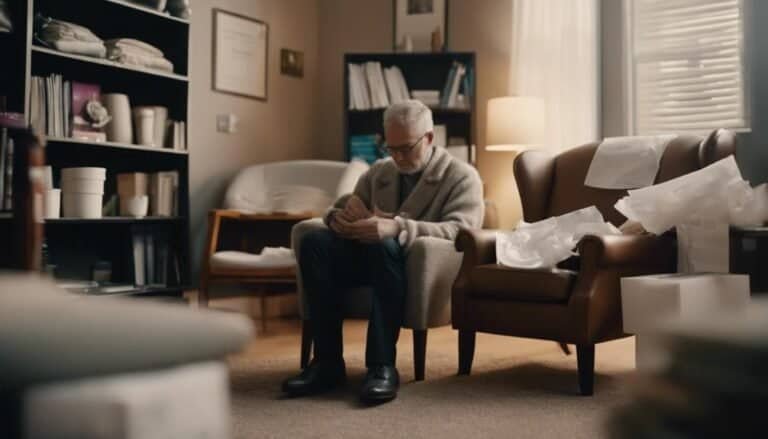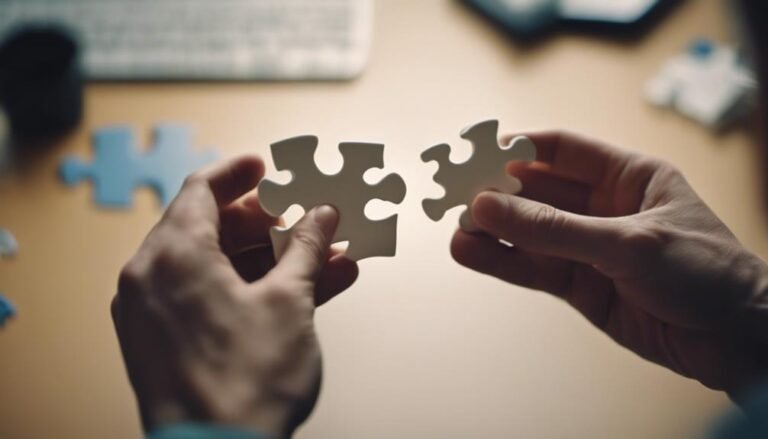Couples Therapy and Communication
In relationships, the way you communicate can greatly impact your connection with your partner. Have you ever found yourself in a situation where a simple disagreement turned into a heated argument, leaving both of you frustrated and misunderstood?
Couples therapy offers a unique opportunity to explore the dynamics of communication within your relationship and discover effective ways to navigate conflicts. By understanding the role of communication in your partnership, you can reveal pathways to deeper understanding and emotional intimacy.
Key Takeaways
- Therapy enhances empathy and understanding for better communication.
- Conflict resolution tools improve disagreements in relationships.
- Addressing past hurts rebuilds trust for a stronger bond.
- Increased emotional intimacy results from improved communication in couples therapy.
Importance of Communication in Relationships
Effective communication is the cornerstone of healthy and thriving relationships. When it comes to fostering a strong connection with your partner, honing your listening skills is important. Listening isn't just about hearing words; it's about truly understanding and empathizing with your partner's feelings and perspective. By actively listening, you show that you value their thoughts and emotions, creating a safe space for open dialogue.
In addition to listening skills, emotional intelligence plays an essential role in effective communication within relationships. Understanding your own emotions and being able to empathize with your partner's feelings can enhance your ability to communicate openly and honestly. Emotional intelligence allows you to navigate difficult conversations with sensitivity and compassion, fostering a deeper bond with your significant other.
Signs of Communication Breakdown
Hey there, noticing signs of communication breakdown in your relationship can be tough. Remember, paying attention to nonverbal cues and practicing active listening techniques can help you understand each other better.
Nonverbal Cues Importance
Understanding the significance of nonverbal cues is pivotal in identifying signs of communication breakdown in couples therapy. When words fail to convey the whole message, paying attention to nonverbal cues can offer valuable insights into the underlying issues affecting the relationship dynamics. Here are four key points to contemplate:
- Body Language: Observing body language can reveal unspoken emotions that words mightn't capture.
- Emotional Connection: Nonverbal cues often indicate the level of emotional connection between partners.
- Nonverbal Cues: These subtle signs can speak volumes about unexpressed feelings and thoughts.
- Relationship Dynamics: Nonverbal communication plays an important role in understanding the dynamics within the relationship.
Active Listening Techniques
Paying attention to active listening techniques can expose subtle signs of communication breakdown in couples therapy that words alone may not reveal. By honing your listening skills and practicing engagement techniques, you can create a space where both partners feel heard and understood.
Validation and empathy practices are key components in active listening, allowing you to mirror back your partner's feelings and show that you genuinely care about their perspective. Through active listening, you can pick up on nuances in tone, body language, and emotional cues that might indicate underlying issues in the relationship.
Benefits of Couples Therapy
When considering the benefits of couples therapy, it becomes evident that enhancing communication skills is a key aspect that can lead to stronger relationships. Couples therapy offers a supportive environment where you and your partner can work on improving how you communicate with each other, ultimately strengthening the bond you share. Here are four benefits you can expect from engaging in couples therapy:
- Improved Understanding: Through therapy, you can gain a deeper understanding of each other's perspectives, feelings, and needs, fostering empathy and compassion.
- Effective Conflict Resolution: Therapy equips you with tools to navigate disagreements constructively, leading to healthier conflict resolution and reduced misunderstandings.
- Rebuilding Trust: By addressing past hurts and fostering open dialogue, couples therapy can help in rebuilding trust and restoring the foundation of your relationship.
- Enhanced Intimacy: Better communication often leads to increased emotional intimacy, bringing you closer together and enhancing your overall connection.
Common Communication Patterns
Exploring through different communication patterns in a relationship can be a challenging yet essential aspect to understand for fostering healthier interactions. Communication dynamics play a vital role in how couples relate to each other. It's common for individuals to fall into specific relationship patterns that can either enhance or hinder effective communication. Identifying these patterns is the first step towards improving how you and your partner interact.
Some common communication patterns include passive-aggressive behavior, where feelings are indirectly expressed through sarcasm or avoidance; aggressive communication, which involves hostility and blaming; and passive communication, where one may avoid conflict by not expressing their needs clearly. Understanding these patterns can help you recognize when they occur and work towards healthier communication strategies.
Role of Active Listening
When engaging in couples therapy, understanding the significance of nonverbal cues and how they contribute to effective communication is crucial.
By actively listening and providing reflective responses, you can enhance your partner's feeling of being heard and understood.
Clarifying any points of confusion or misunderstanding can help strengthen the connection between you and your partner.
Nonverbal Cues Importance
Understanding the significance of nonverbal cues in communication can greatly enhance the effectiveness of active listening in couples therapy. When you pay attention to body language and facial expressions, you can pick up on unspoken emotions and thoughts.
Here are four ways nonverbal cues play a vital role in active listening in therapy:
- Enhancing Understanding: Nonverbal cues provide additional context to verbal communication.
- Building Empathy: They help you connect emotionally with your partner's experience.
- Detecting Deception: Nonverbal cues can reveal hidden feelings or intentions.
- Encouraging Openness: By acknowledging nonverbal cues, you create a safe space for deeper communication.
Reflective Responses Enhance
To deepen your connection and foster effective communication in couples therapy, incorporating reflective responses enhances the role of active listening. Reflective responses involve mirroring back your partner's thoughts and feelings, showing that you understand and empathize with their perspective. This technique not only demonstrates emotional validation but also helps in maneuvering complex relationship dynamics.
By engaging in reflective listening, you create a safe space for open dialogue and build mutual trust. When you validate your partner's emotions through reflective responses, you acknowledge their feelings and show respect for their experiences. This can lead to a deeper understanding of each other and pave the way for resolving conflicts in a constructive manner.
Embracing reflective responses in your communication can greatly improve your relationship and strengthen your bond.
Clarifying for Understanding
Using clarifying questions during active listening helps ensure that you and your partner fully understand each other's perspectives and feelings. It's crucial to enhance connection and improve comprehension in your relationship.
Here are some key points to remember:
- Show Empathy: Reflect on what your partner is saying to demonstrate understanding.
- Ask Open-Ended Questions: Encourage your partner to elaborate on their thoughts and emotions.
- Paraphrase Back: Repeat what you understood to guarantee you interpreted correctly.
- Avoid Assumptions: Clarify any uncertainties instead of jumping to conclusions.
Effective Communication Techniques
Effective communication in couples therapy involves actively listening to your partner without interrupting. Building rapport through attentive listening can set a positive tone for the conversation. When providing feedback, it's essential to do so constructively, focusing on expressing your thoughts and feelings without blaming or criticizing your partner. Effective feedback helps in fostering a safe environment where both partners feel heard and understood.
In addition to listening and providing feedback, using 'I' statements can be beneficial. Instead of saying, 'You always make me feel ignored,' try expressing it as, 'I feel ignored when I don't get a chance to speak.' This shift in language can prevent defensiveness and encourage open dialogue.
Another technique is to practice reflective listening. This involves paraphrasing what your partner said to make certain you understood correctly. It shows your partner that you're actively engaged in the conversation and care about their perspective. By incorporating these techniques into your communication style, you can strengthen your relationship and work towards resolving conflicts effectively.
Building Empathy and Understanding
Understanding your partner's perspective and showing empathy are vital aspects of nurturing a healthy relationship. By actively listening and putting yourself in their shoes, you can strengthen your emotional bond and build trust.
Embracing empathy allows you to create a safe space for open communication and mutual understanding in your relationship.
Empathy in Relationships
To truly connect with your partner on a deeper level, fostering empathy in your relationship is essential. Here are some tips to help you build empathy and understanding:
- Practice active listening without interrupting or formulating your response while your partner speaks.
- Engage in empathy exercises like mirroring your partner's feelings to show that you understand and validate their emotions.
- Take time to understand your partner's perspective, even if you don't agree with it, to strengthen your bond.
- Be mindful of non-verbal cues and body language to better interpret your partner's emotions and improve communication in your relationship dynamics.
Understanding Your Partner
Fostering empathy in your relationship involves actively listening to your partner without judgment and engaging in exercises that validate their emotions. Emotional intelligence plays a vital role in understanding your partner's feelings, needs, and perspectives. By honing your emotional intelligence, you can better comprehend your partner's emotional cues and respond empathetically.
Understanding your partner also requires delving into the intricacies of relationship dynamics. Recognizing patterns of communication, triggers, and conflict resolution styles can deepen your understanding of your partner's behaviors and motivations. By actively seeking to understand your partner on a deeper level, you can strengthen your connection, build trust, and nurture a more fulfilling relationship based on empathy and mutual understanding.
Overcoming Communication Barriers
In maneuvering the challenges of communication barriers, one must recognize the unique perspectives and emotions that each partner brings to the table. Here are some strategies to help you overcome these barriers:
- Active Listening: Take the time to truly listen to your partner without interruptions or distractions. Show that you understand their point of view by reflecting back what they've said.
- Empathy: Put yourself in your partner's shoes to understand their feelings and perspective. Empathy can help bridge the gap in communication and foster a deeper connection.
- Clarify Misunderstandings: If something is unclear, ask for clarification instead of making assumptions. Misunderstandings can often lead to communication breakdowns.
- Use 'I' Statements: When expressing your thoughts and feelings, use 'I' statements to avoid sounding accusatory. This can help prevent conflicts and promote a more constructive dialogue.
Strengthening Emotional Connection
Strengthening your emotional connection with your partner requires genuine understanding and open communication. Emotional intimacy and relationship bonding are essential components that deepen the connection between you and your significant other. To enhance these aspects, consider the following strategies:
| Strategies | Description | Benefits |
|---|---|---|
| Active Listening | Focus on truly hearing and understanding your partner without interrupting or formulating responses. | Enhances empathy and fosters a sense of validation. |
| Quality Time Together | Dedicate uninterrupted time to each other to nurture your bond and create lasting memories. | Strengthens the emotional connection and builds trust. |
| Expressing Gratitude | Regularly show appreciation for your partner's actions and qualities to reinforce positive feelings. | Cultivates a sense of reciprocity and mutual respect. |
Sustaining Healthy Communication
To maintain healthy communication in your relationship, it's important to prioritize listening actively and with empathy. Effective communication strategies can greatly impact your relationship dynamics.
Here are four key points to help you sustain healthy communication:
- Practice Active Listening: Make a conscious effort to truly hear and understand your partner's perspective without interrupting or formulating your response while they speak.
- Express Empathy: Show empathy by acknowledging your partner's feelings and validating their emotions, even if you don't necessarily agree with their point of view.
- Use 'I' Statements: When expressing your thoughts or feelings, use 'I' statements to take ownership of your emotions and avoid sounding accusatory.
- Encourage Open Dialogue: Create a safe space for open and honest communication where both partners feel comfortable sharing their thoughts, concerns, and needs without fear of judgment.
Frequently Asked Questions
How Can Couples Therapy Help With Intimacy Issues Within a Relationship?
To improve intimacy in your relationship, focus on nurturing trust and emotional connections. Open communication, vulnerability, and understanding each other's needs can deepen your bond. Seek support together to navigate challenges and strengthen your connection.
What Are Some Common Misconceptions About Communication in Relationships That Can Be Addressed in Therapy?
Sometimes, you see the storm but miss the rainbow. Misunderstandings cloud your vision, like shadows at dusk. Unraveling communication patterns reveals the hidden hues of relationship dynamics, guiding you to clearer skies.
How Can Couples Therapy Help With Rebuilding Trust After a Breach in Communication?
Rebuilding trust after a breach in communication can be challenging. Effective communication in therapy helps you understand each other's perspectives, express emotions openly, and work together to heal. Trust grows as you learn to listen and communicate better.
Are There Specific Communication Exercises or Activities That Are Commonly Used in Couples Therapy Sessions?
When you're working on enhancing communication in relationships, role playing exercises can be beneficial for understanding each other's perspectives, while active listening techniques foster deeper connections by showing genuine interest and empathy.
How Long Does It Typically Take to See Improvements in Communication After Starting Couples Therapy?
Improvements in communication after starting therapy can vary. On average, couples may start seeing progress in their communication skills within a few weeks to a few months. It's important to stay committed and open during the process.
Conclusion
As you navigate the ups and downs of communication in your relationship, remember that like a delicate dance, it takes two to tango.
Just as a well-choreographed routine requires both partners to move in harmony, effective communication in couples therapy relies on mutual understanding and empathy.
By actively listening, building empathy, and overcoming barriers together, you can strengthen your emotional connection and sustain healthy communication for a lasting and fulfilling relationship.







